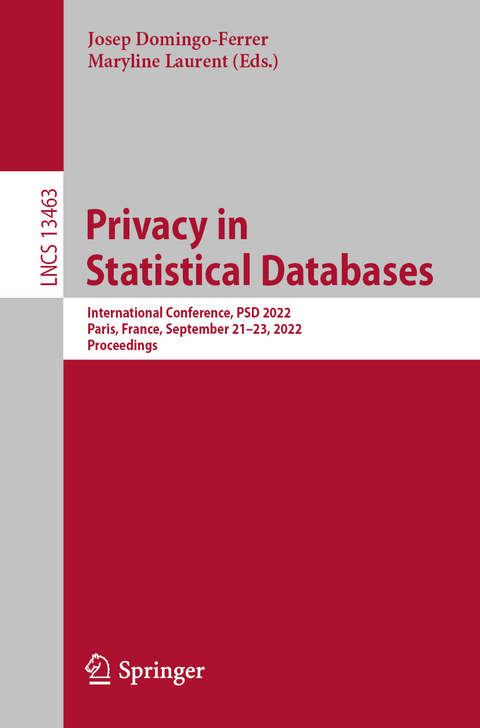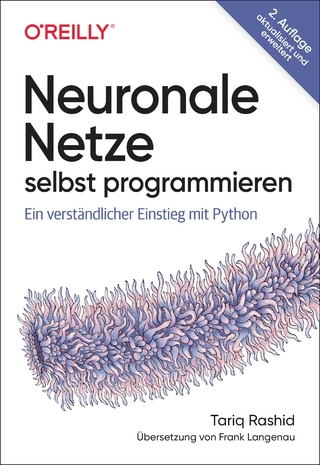
Privacy in Statistical Databases
Springer International Publishing (Verlag)
978-3-031-13944-4 (ISBN)
The 25 papers presented in this volume were carefully reviewed and selected from 45 submissions. They were organized in topical sections as follows: Privacy models; tabular data; disclosure risk assessment and record linkage; privacy-preserving protocols; unstructured and mobility data; synthetic data; machine learning and privacy; and case studies.
Privacy models.- An optimization-based decomposition heuristic for the microaggregation problem.- Privacy Analysis with a Distributed Transition System and a data-wise metric.- Multivariate Mean Comparison under Differential Privacy.- Asking The Proper Question: Adjusting Queries To Statistical Procedures UnderDifferential Privacy.- Towards integrally private clustering: overlapping clusters for high privacy guarantees.- Tabular data.- Perspectives for Tabular Data Protection - How About Synthetic Data?.- On Privacy of Multidimensional Data Against Aggregate Knowledge Attacks.- Synthetic Decimal Numbers as a Flexible Tool for Suppression of Post-published Tabular Data.- Disclosure risk assessment and record linkage.- The risk of disclosure when reporting commonly used univariate statistics.- Privacy-Preserving protocols.- Tit-for-Tat Disclosure of a Binding Sequence of User Analysesin Safe Data Access Centers.- Secure and non-interactive k-NN classifier using symmetric fully homomorphic encryption.- Unstructured and mobility data.- Automatic evaluation of disclosure risks of text anonymization methods.- Generation of Synthetic Trajectory Microdata from Language Models.- Synthetic data.- Synthetic Individual Income Tax Data: Methodology, Utility, and Privacy Implications.- On integrating the number of synthetic data sets m into the a priori synthesis approach .- Challenges in Measuring Utility for Fully Synthetic Data.- Comparing the Utility and Disclosure Risk of Synthetic Data with Samples of Microdata.- Utility and Disclosure Risk for Differentially Private Synthetic Categorical Data.- Machine learning and privacy.- Membership Inference Attack Against Principal Component Analysis.- When Machine Learning Models Leak: An Exploration of Synthetic Training Data.- Case studies.- A Note on the Misinterpretation of the US Census Re-identification Attack.- A Re-examination of the Census Bureau Reconstruction and Reidentification Attack.- Quality Assessment of the 2014 to 2019 National Survey on Drug Use and Health (NSDUH) Public Use Files.- Privacy in Practice: Latest Achievements of the EUSTAT SDC group.- How Adversarial Assumptions Influence Re- identification Risk Measures: A COVID-19 Case Study.
| Erscheinungsdatum | 06.08.2022 |
|---|---|
| Reihe/Serie | Lecture Notes in Computer Science |
| Zusatzinfo | XI, 376 p. 98 illus., 66 illus. in color. |
| Verlagsort | Cham |
| Sprache | englisch |
| Maße | 155 x 235 mm |
| Gewicht | 586 g |
| Themenwelt | Informatik ► Datenbanken ► Data Warehouse / Data Mining |
| Informatik ► Theorie / Studium ► Künstliche Intelligenz / Robotik | |
| Schlagworte | Access Control • Applications • Computer Science • Computer Security • conference proceedings • cryptography • data anonymization • Data handling • data integration • Data Mining • data privacy • Disclosure risk assessment • Informatics • integrated data • Network Protocols • Network Security • privacy • Privacy in official and corporate statistics • Privacy models • privacy preserving • privacy-preserving protocols • Record Linkage • Research • synthetic data |
| ISBN-10 | 3-031-13944-5 / 3031139445 |
| ISBN-13 | 978-3-031-13944-4 / 9783031139444 |
| Zustand | Neuware |
| Informationen gemäß Produktsicherheitsverordnung (GPSR) | |
| Haben Sie eine Frage zum Produkt? |
aus dem Bereich


